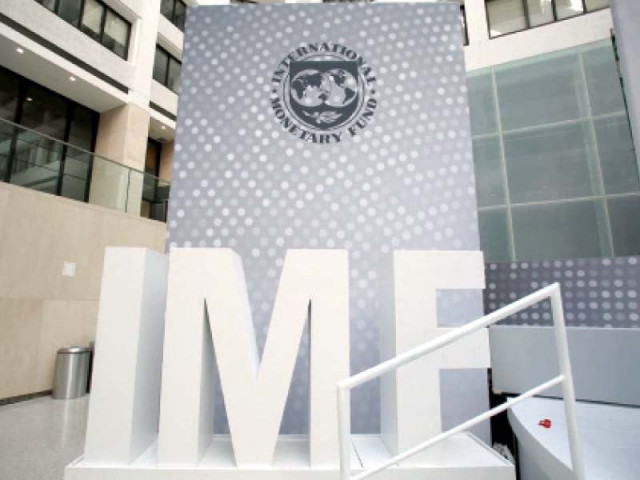Impasse in talks with IMF on debt surcharge
Both sides agree to continue deliberations

Pakistan and the International Monetary Fund (IMF) on Wednesday failed to break impasse on a new contentious issue of permanently imposing a Rs3.82 per unit debt surcharge to recover Rs284 billion more from electricity consumers.
Against the government’s decision to impose the new surcharge for eight months (March-October 2023), the IMF has asked the government to keep the levy as a permanent fixture in electricity bills until the government settles the Rs800 billion circular debt parked in a company.
Meanwhile, confusion prevailed on Wednesday when the finance ministry took the position different from what the Power Division had communicated to the IMF a day earlier.
This once again underscored lack of coordination among key government departments, which is contributing towards an inordinate delay in reaching a staff-level agreement with the IMF.
A meeting between Finance Minister Ishaq Dar and the IMF Mission Chief Nathan Porter ended with a note that the two sides would meet again to sort out the issue, according to officials privy to these discussions.
Dar is set to leave for Uzbekistan on Thursday (today) on a two-day official visit. During the meeting, both the sides also discussed the issue of $11 billion external financing gap, which the IMF had projected for the current fiscal year.
Pakistan is confident that the gap will be less than $10 billion and that it can bridge it by securing fresh commercial loans from Gulf countries. The IMF is already in touch with regional countries about their plans to give fresh loans to Pakistan, including rollovers.
The sources said that the finance minister urged the IMF to announce the staff-level agreement since the country had met more than 90% of the conditions. But the IMF termed Rs3.82 per unit debt surcharge as “critical” for the resolution of the power sector circular debt, which will still climb to Rs2.4 trillion despite massive increase in the power tariffs.
The 10-day IMF staff-level visit ended on February 9 and despite taking two more weeks both sides have yet to end their differences on major policy matters.
The debt surcharge issue has hampered the finalisation of the staff-level agreement, as the IMF is not inclined to accept the government’s plan to impose the surcharge only for eight months. There is already 43 paisa per unit surcharge, while the IMF is asking for Rs3.39 per unit more to recover a total Rs284 billion.
A day earlier, the power secretary gave the understanding that the government stood ready to impose the total Rs3.82 per unit surcharge.
The sources said that the IMF told the government that it had informed in the February 9 meeting – the last day of the staff-level talks – that Pakistan has to impose the surcharge permanently for the next fiscal year to address a major contributor to the circular debt flow.
However, the finance ministry was of the view that it was not aware of any understanding reached with the Power Division, as the surcharge might also trigger court cases that would halt the recoveries.
The IMF has been told that the government will now consult with the Power Division and the Law Division before making any commitment for imposing the Rs3.82 per unit surcharge.
The government has already conceded to imposing the Rs3.82 per unit surcharge for the March-October period aimed at collecting Rs76 billion in this fiscal year to pay the interest on the Rs800 billion circular debt parked in the Power Holding Limited (PHL).
The PHL is a wholly-owned government entity, established for the purpose of securing financing for the power sector. The PHL regularly borrows from the commercial banks. The debt is guaranteed by the finance ministry and the proceeds are used to pay off liabilities of the power sector.
The PHL was used mainly because the power sector could not function owing to heavy amount of payables towards the IPPs and others. The obligation to pay to the IPPs is also guaranteed under the government’s policy.
To recover the mark-up portion of the loans, amounting Rs246 billion, there is already a surcharge of 43 paisa per unit levied in the consumer bill, which is not sufficient to cover mark-up charges of total loans.
On February 14, the finance ministry informed the federal cabinet that the IMF had set prior actions to recoup the deferred June and July 2022 fuel cost adjustments, starting March 1, 2023, to implement a surcharge of Rs3.82 per unit from March 1, 2023 and to withdraw recently announced subsidies to Zero-Rated Industry and agriculture subsidy packages from March.
Some of the cabinet members were of the view that it was high time that Pakistan should introspect instead of blaming the IMF and start taking painful policy decisions or else the country would never be free of its cycle of crises.
The cabinet members called for reforming the bloated state-owned enterprises, which drain billions from the government every month.
As of December 31, 2022, around Rs224 billion has been paid as interest charges from the electricity generation portion, which the IMF now wants to eliminate to reduce the future circular debt flows.
No cash flow exists to service the principal amount of debt. In order to retire the old stock, the government will have to book the circular debt as part of the public debt.
The government’s fiscal woes would further heighten, including in the power sector due to an anticipated around 3% increase in the interest rates by the SBP. The government on Wednesday borrowed from the banks at 19.95% interest rate for three months, after banks refused to lend loans at 18% rate.



















COMMENTS
Comments are moderated and generally will be posted if they are on-topic and not abusive.
For more information, please see our Comments FAQ